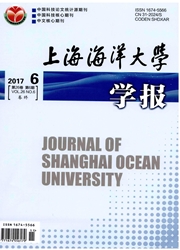

 中文摘要:
中文摘要:
利用人工诱变和体细胞再生技术,选育出可在30℃下生长的坛紫菜耐高温品(Q-1),实验结果表明:(1)在高温(28℃和30℃)下培养15d,Q-1品系的壳孢子成活率分别为76.8%和60.1%,分裂率分别为100%和83%;而对照组野生型(WT)品系的壳孢子成活率分别为15.9%和6.7%,分裂率分别为90.4%和63.8%。Q-1品系的壳孢子成活率和分裂率均远高于WT品系。(2)在常温(24℃)下培养35d的Q-1和WT品系壳孢子苗,在24℃、28℃和30℃组中再分别培养25d,Q-1品系的苗平均体长分别增加了19.4、10.8和2.8倍,而WT品系的苗平均体长分别只增加了7.3、1.7和0.9倍;Q-1品系的苗平均体长分别为WT品系的2.5、5.8和1.9倍。另外,在28℃和30℃中培养15d的WT品系幼苗发生了大面积腐烂;而Q-1品系幼苗没有出现任何烂苗迹象,表现出较好的生长。Q-1品系在海区中试中也表现出很好的耐高温特性。2008年秋季,坛紫菜采苗后遇到了长时间的高温天气,当地传统养殖的坛紫菜野生种发生了大规模腐烂与脱苗,产量大幅度减少;而Q-1品系的苗仍然维持良好的生长势头,没有出现烂苗,取得了高产。由此证实,Q-1品系是既能较快生长又耐高温的品系,有很大的生产应用价值。
 英文摘要:
英文摘要:
Porphyra haitanensis is one of the most important cultivars of marine algae in China,but its production and quality can be significantly jeopardized by execrable environments such as high temperature,therefore,selection of a heat-resistant strain will greatly benefit the nori industry. To this end,in the present study,we selected a meliorated strain Q-1 which has significant heat-tolerance to 30 ℃. Upon further characterizing the cultures of strains Q-1 and WT at 28 and 30 ℃,we show here that in a period of 15 days,the Q-1 conchospores survived at rates of 76.8% and 60.1%,respectively,while the WT conchospores survived at much lower rates of 15.9% and 6.7%. The Q-1 conchospores also divided at significantly higher rates of 100% and 83%,as compared with those of 90.4% and 63.8% for the WT conchospores,respectively. When the 35-day-old conchospore germlings were cultured at 24,28 and 30 ℃ for 25 days,the mean length of blades increased 19.4,10.8 and 2.8 times for Q-1,and only 7.3,1.7 and 0.9 times for WT compared with the original mean length,respectively. At 24,28 and 30 ℃,the blades of strain Q-1 grew 1.5,4.8 and 0.9 times faster than those of the WT,the blades of WT strain began to decay after being cultured for 15 days,however,the blades of Q-1 strain did not decay even being cultured for 25 days. The blades of Q-1 strain also showed excellent high-temperature tolerance during its large-scale cultivation in sea area. In the last autumn,the high temperature (28-30 ℃) continued for about two months after conchospore-seeding of Porphyra haitanensis,the blades of the WT decayed on a large scale and the production decreased significantly; while the blades of the Q-1 grew normally with rapid growth and did not decay,and the production was much higher than that of the WT. The above results indicated that the strain Q-1 is a fast growing and heat-resistant strain that may offer broad applications for the nori industry.
 同期刊论文项目
同期刊论文项目
 同项目期刊论文
同项目期刊论文
 Genetic analysis of the position of meiosis in Porphyra haitanensis Chang et Zheng (Bangiales, Rhodo
Genetic analysis of the position of meiosis in Porphyra haitanensis Chang et Zheng (Bangiales, Rhodo 期刊信息
期刊信息
